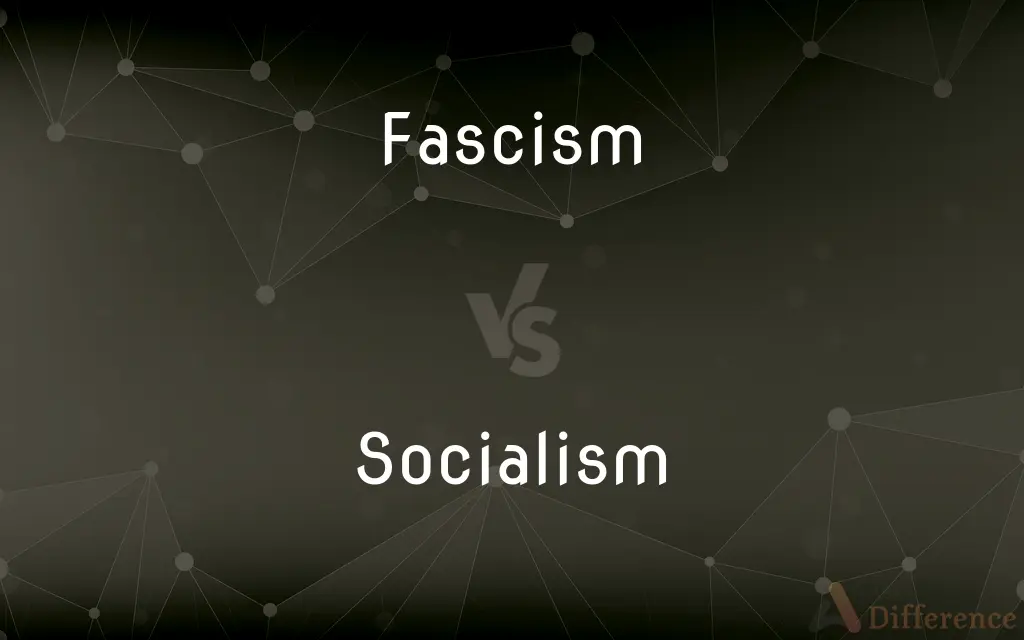Fascism vs. Socialism — What's the Difference?
By Tayyaba Rehman — Updated on September 16, 2023
Fascism emphasizes a strong centralized authority and nationalism, often at the expense of individual rights; Socialism focuses on collective or governmental ownership and administration of the means of production for equal benefit.

Difference Between Fascism and Socialism
Table of Contents
ADVERTISEMENT
Key Differences
Fascism is a political ideology that centralizes power, promotes extreme nationalism, and often suppresses dissent and opposition. In contrast, Socialism is an economic and political system in which the means of production are owned and controlled collectively or by the state, with an aim for equitable distribution.
Fascism is often linked with dictatorial power, militarism, and suppression of individual freedoms. Socialism, on the other hand, seeks a balance between individual and collective rights, prioritizing social welfare and reducing income disparities.
While Fascism promotes the idea of a unified national identity, often sidelining minorities, Socialism tends to emphasize the common good, aiming to reduce or eliminate the class struggle by ensuring everyone has access to basic necessities.
Fascism can lead to extreme forms of nationalism, often with a disdain for democratic processes and an emphasis on autocratic leadership. In contrast, Socialism can be practiced within democratic structures, where citizens have a say in governance and policy-making.
Historically, Fascism arose as a reaction to perceived threats from communism and liberalism, with a focus on preserving the status quo or returning to a perceived golden age. Socialism, however, arose from a desire to address the inequities inherent in capitalist systems, aiming to redistribute wealth and resources more equitably.
ADVERTISEMENT
Comparison Chart
Core Principle
Centralized power and extreme nationalism
Collective ownership and administration of means of production
View on Individual Rights
Often suppressed for the state's interest
Balanced with collective rights
Economic Model
Can coexist with various economic structures
Advocates for collective or state ownership of key industries
Leadership Style
Autocratic, dictatorial
Can be democratic
Historical Origins
Reaction to threats from communism and liberalism
Response to inequities of capitalism
Compare with Definitions
Fascism
A political ideology emphasizing centralized power and extreme nationalism.
The rise of Fascism in the 20th century led to global conflicts.
Socialism
An economic system where means of production are collectively owned.
Countries like Sweden have elements of Socialism in their mixed economies.
Fascism
Prioritizes the state over individual freedoms.
Fascism seeks a singular national identity, sidelining or oppressing minorities.
Socialism
Advocates for equitable distribution of wealth and resources.
Socialism aims to ensure everyone has access to basic services.
Fascism
A system that suppresses dissent in favor of a unified national identity.
Under Fascism, individual rights were often suppressed for state interests.
Socialism
Can be practiced within democratic structures.
Democratic Socialism allows citizens a say in governance and economic policies.
Fascism
Emphasizes a return to traditional values and a rejection of perceived threats.
Fascism often arises in response to societal changes or perceived threats to national identity.
Socialism
Aims to reduce or eliminate class struggle.
Through Socialism, many hope to address systemic income inequalities.
Fascism
Often linked with autocratic leadership and militarism.
Many associate Fascism with dictatorial regimes and militaristic ambitions.
Socialism
Emphasizes social welfare and public ownership of key industries.
Under Socialism, industries like healthcare might be publicly owned and operated.
Fascism
Fascism () is a form of far-right, authoritarian ultranationalism characterized by dictatorial power, forcible suppression of opposition, and strong regimentation of society and of the economy, which came to prominence in early 20th-century Europe. The first fascist movements emerged in Italy during World War I, before spreading to other European countries.
Socialism
Socialism is a political, social, and economic philosophy encompassing a range of economic and social systems characterised by social ownership of the means of production. It includes the political theories and movements associated with such systems.
Fascism
An authoritarian and nationalistic right-wing system of government and social organization.
Socialism
Any of various theories or systems of social organization in which the means of producing and distributing goods is owned collectively or by a centralized government that often plans and controls the economy.
Fascism
A system of government marked by centralization of authority under a dictator, a capitalist economy subject to stringent governmental controls, violent suppression of the opposition, and typically a policy of belligerent nationalism and racism.
Socialism
The stage in Marxist-Leninist theory intermediate between capitalism and communism, in which the means of production are collectively owned but a completely classless society has not yet been achieved.
Fascism
A political philosophy or movement based on or advocating such a system of government.
Socialism
Any of various economic and political theories advocating collective or governmental ownership and administration of the means of production and distribution of goods.
Fascism
Oppressive, dictatorial control.
Socialism
A system of social and economic equality in which there is no private property.
Fascism
Any right-wing, authoritarian, nationalist ideology characterized by centralized, totalitarian governance, strong regimentation of the economy and society, and repression of criticism or opposition.
Socialism
A system or condition of society in which the means of production are owned and controlled by the state.
Fascism
Any system of strong autocracy or oligarchy usually to the extent of bending and breaking the law, race-baiting, and/or violence against largely unarmed populations.
Socialism
(Marxism-Leninism) The intermediate phase of social development between capitalism and communism in Marxist theory in which the state has control of the means of production.
Fascism
Any extreme reliance on or enforcement of rules and regulations.
Socialism
Any of a group of later political philosophies such democratic socialism and social democracy which do not envisage the need for full state ownership of the means of production nor transition to full communism, and which are typically based on principles of community decision making, social equality and the avoidance of economic and social exclusion, with economic policy giving first preference to community goals over individual ones.
Fascism
A political theory advocating an authoritarian hierarchical government; - opposed to democracy and liberalism.
Socialism
Any left-wing ideology, government regulations, or policies promoting a welfare state, nationalisation, etc.
Fascism
An authoritarian system of government under absolute control of a single dictator, allowing no political opposition, forcibly suppressing dissent, and rigidly controlling most industrial and economic activities. Such regimes usually try to achieve popularity by a strongly nationalistic appeal, often mixed with racism.
Socialism
A theory or system of social reform which contemplates a complete reconstruction of society, with a more just and equitable distribution of property and labor. In popular usage, the term is often employed to indicate any lawless, revolutionary social scheme. See Communism, Fourierism, Saint-Simonianism, forms of socialism.
[Socialism] was first applied in England to Owen's theory of social reconstruction, and in France to those also of St. Simon and Fourier . . . The word, however, is used with a great variety of meaning, . . . even by economists and learned critics. The general tendency is to regard as socialistic any interference undertaken by society on behalf of the poor, . . . radical social reform which disturbs the present system of private property . . . The tendency of the present socialism is more and more to ally itself with the most advanced democracy.
We certainly want a true history of socialism, meaning by that a history of every systematic attempt to provide a new social existence for the mass of the workers.
Fascism
Specifically, the Fascist movement led by Benito Mussolini in Italy from 1922 to 1943.
Socialism
A political theory advocating state ownership of industry
Fascism
Broadly, a tendency toward or support of a strongly authoritarian or dictatorial control of government or other organizations; - often used pejoratively in this sense.
Socialism
An economic system based on state ownership of capital
Fascism
A political theory advocating an authoritarian hierarchical government (as opposed to democracy or liberalism)
Common Curiosities
Is Socialism the same as communism?
No, while both advocate collective ownership, communism seeks a classless society, while Socialism can coexist with class structures.
Can a country have elements of both Fascism and Socialism?
It's unlikely, given their differing core principles, but elements of both could theoretically coexist in a hybrid system.
What is the core difference between Fascism and Socialism?
Fascism emphasizes centralized power and nationalism, while Socialism emphasizes collective ownership for equitable benefit.
What are the economic implications of Fascism?
Fascism can coexist with various economic structures; its primary focus is on nationalism and centralized power.
Does Socialism always involve government control?
Not always. Some forms advocate community or worker ownership, but it generally involves collective control.
Are there countries today that practice pure Socialism?
Few countries practice pure Socialism; most have mixed economies with Socialist elements.
Are all nationalist movements Fascist?
No, while Fascism emphasizes nationalism, not all nationalist movements are Fascist.
Does Fascism always involve dictatorship?
While not inherent, Fascism historically leans towards autocratic leadership and suppresses dissent.
Is Socialism against individual rights?
No, Socialism seeks a balance between individual and collective rights, focusing on social welfare.
Which countries have historically followed Fascism?
Countries like Italy under Mussolini and Germany under Hitler are examples of Fascist regimes.
Is Fascism left or right-wing?
Fascism is typically associated with far-right political ideologies.
Can Socialism coexist with democracy?
Yes, democratic Socialism is a system where Socialist principles are practiced within a democratic framework.
What's the goal of Socialism in terms of income distribution?
Socialism aims for a more equitable distribution of wealth and resources.
Do all Socialists oppose capitalism?
Not all. Some Socialists seek to reform capitalism, while others advocate for its replacement.
Does Fascism prioritize the individual or the state?
Fascism typically prioritizes the state over individual freedoms.
Share Your Discovery

Previous Comparison
Had vs. Has
Next Comparison
Proffer vs. OfferAuthor Spotlight
Written by
Tayyaba RehmanTayyaba Rehman is a distinguished writer, currently serving as a primary contributor to askdifference.com. As a researcher in semantics and etymology, Tayyaba's passion for the complexity of languages and their distinctions has found a perfect home on the platform. Tayyaba delves into the intricacies of language, distinguishing between commonly confused words and phrases, thereby providing clarity for readers worldwide.














































